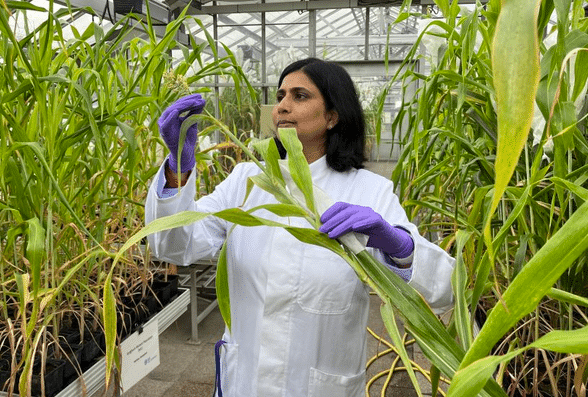Natural adaptations enable plants to flourish in difficult conditions. New features, such as drought tolerance and disease resistance, are produced through spontaneous natural mutations and can aid the plant in thriving. However, the rate of climate change on Earth is accelerating beyond the capacity of plants to adapt organically, putting many of the food-producing plants in danger.
A growing season may be extended or new crops may be cultivated due to changes in temperature, precipitation patterns, and frost, but agriculture is very vulnerable to the effects of changing climate conditions. Climate change also poses significant obstacles to farming.
Now, scientists are turning to the vastness of space for solutions.
In 2022, the joint laboratories of the International Atomic Energy Agency (IAEA) and the UN’s Food and Agriculture Organization (FAO) sent seeds on a trip to the International Space Station (ISS). The objective: to induce genetic mutations in the seeds through exposure to cosmic radiation and microgravity, that could help develop resilient crops capable of thriving in the face of the escalating climate crisis.
Seeds of a cereal grain called sorghum, and a type of cress called Arabidopsis, spent several months on the ISS before they were returned to Earth this April for analysis. Now screening will begin to identify favorable traits in the mutated seeds.
Shoba Sivasankar, head of Plant Breeding and Genetics for the joint FAO and IAEA Center of Nuclear Techniques in Food and Agriculture, explains that scientists are able to artificially induce plant mutations on Earth using gamma rays and X-rays.
However, the space environment, which offers a broader spectrum of radiation and additional extremes like microgravity and temperature fluctuations, has the potential to induce genetic alterations that differ from, or are induced much quicker than, those typically observed using terrestrial radiation sources.
“In space, the stress that will be encountered by an organism would be at the highest level and beyond anything that we can actually simulate on Earth,” explains Sivasankar. She adds that the radiation outside the ISS could be “more than a hundredfold higher” than the natural radiation possible on Earth.
By selectively breeding plants grown from the mutated seeds, Sivasankar and her team hope to create new crop strains.
“Firstly, we are working on improving crop yields and productivity of crops such as grains, legumes, roots and tubers – for example, cassava and sweet potato,” she says. “And then there is climate change resilience – for example resistance to increasing incidence of diseases, tolerance of climate phenomenon such as drought, or high heat, and increasing salinity of the soil because of saltwater intrusion or irrigation and evaporation.”
For decades scientists have been sending seeds to space. China has been using space radiation to induce genetic mutation in crops since the 1980s, exposing seeds to cosmic radiation via satellites and high-altitude balloons, which reportedly facilitated the production of giant sweet peppers and improvements in wheat and rice.
Many different varieties of seed have been aboard the International Space Station, while researchers at Michigan State University (MSU) are currently experimenting with the cultivation of seeds that were sent on a journey around the moon as part of NASA’s Artemis program.
The MSU scientists are exploring the effect of extraterrestrial conditions on plant amino acids – the building block of proteins – and evaluating how that impacts plant growth and development. The research could offer insights into the adaptive capabilities of plants in extreme environments, and help us understand how crops could potentially be grown off-Earth for long-duration space missions.
The private sector has also taken an interest in the impact of spaceflight on plant seeds. In the United Arab Emirates, StarLab Oasis, an Abu Dhabi-based startup, has announced plans to send quinoa seeds into space in the hopes of enhancing the genetic potential of a crop that holds promise for its nutritional value and adaptability in arid regions.
Sending seeds to space will help “sustainability, climate change, and food security on Earth,” StarLab Oasis’ co-founder Allen Herbert told CNN in 2022. “Space is a place where you have limited resources, limited energy, limited space. It’s the perfect place to do research and that same technology can be brought right back down to Earth.”
It’s that same hope of finding solutions for Earthbound agriculture that’s driving Sivasankar, and the IAEA says initial results from its research could be available later this year.
“I do feel hopeful for the future of food security, because technology is coming to the fore,” she says. “But food security is not just about genetics – we need a combination of all technologies, and everybody needs to come together and work together.”


